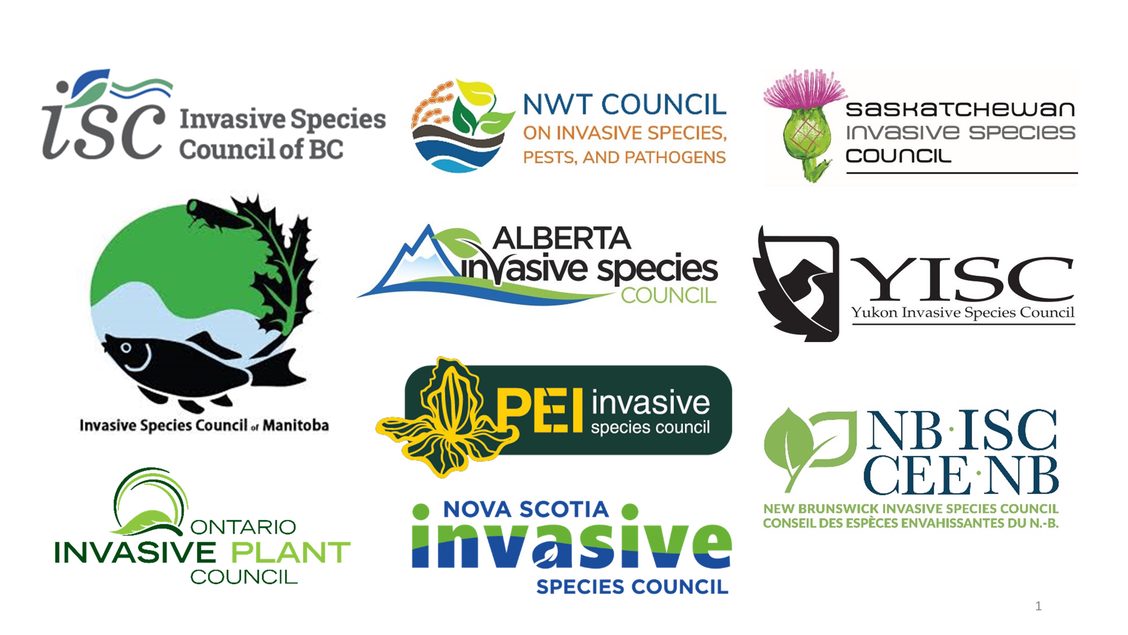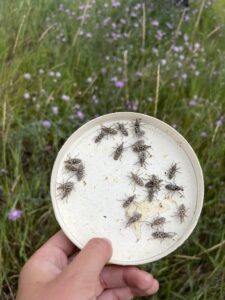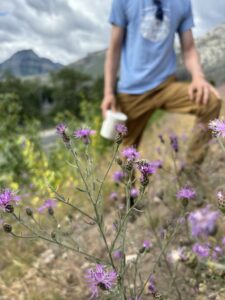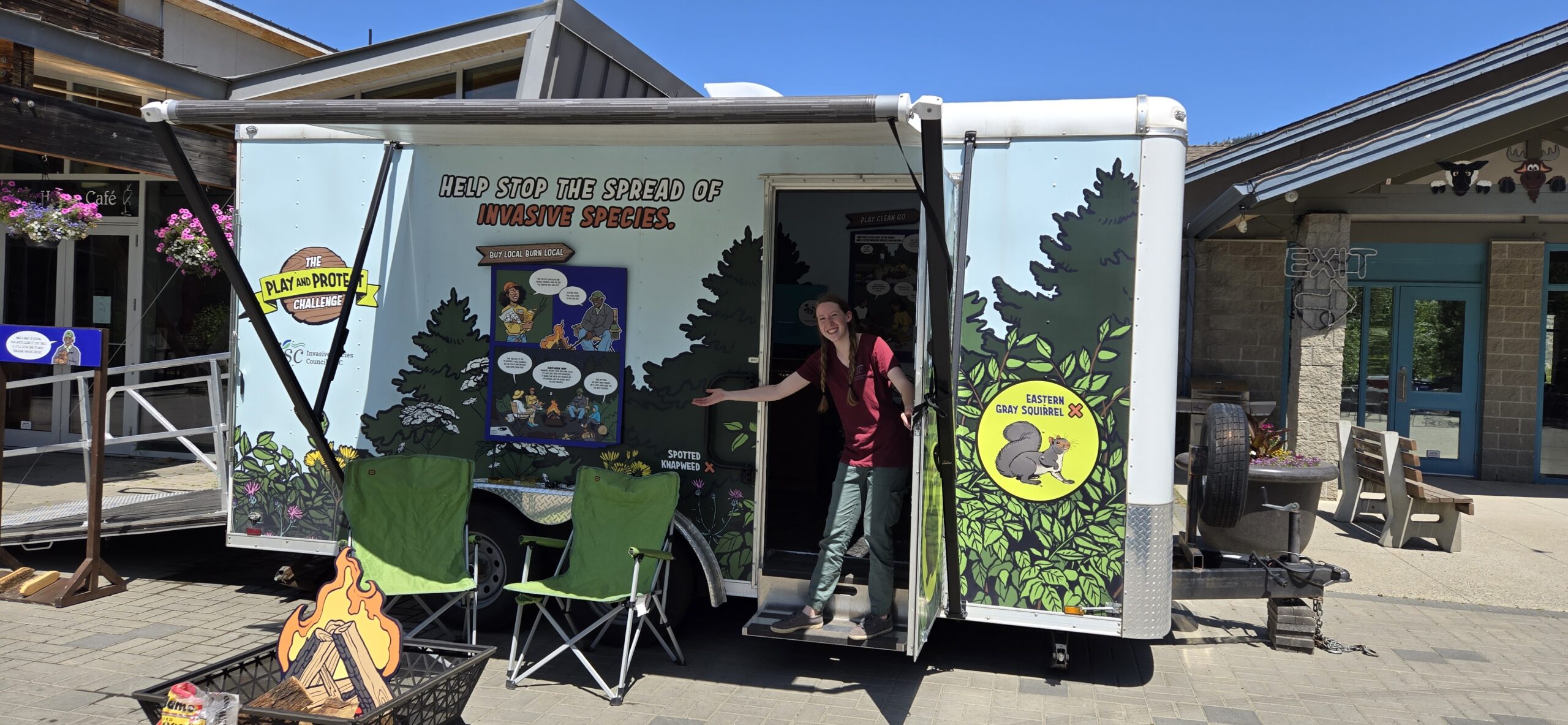Summer is in full swing! Our Chapters across the country have been busy in the field and in their communities.
Continue reading for updates on the work our Chapters have been engaged in the past few months.
The Canadian Council on Invasive Species has established a strong network of chapters spanning across Canada, from coast to coast. Each of our 10 chapters is a provincial or territorial invasive species organization with a unique structure and mandate. They work together to create partnerships and address local issues while ensuring consistent messaging and resources to help Canadians take responsible actions.
Our Chapters include:
- Alberta Invasive Species Council
- Invasive Species Council of BC
- Invasive Species Council of Manitoba
- New Brunswick Invasive Species Council
- Northwest Territories Council on Invasive Species, Pests and Pathogens
- Nova Scotia Invasive Species Council
- Ontario Invasive Plant Council
- Prince Edward Island Invasive Species Council
- Saskatchewan Invasive Species Council
- Yukon Invasive Species Council

Here’s an update from some of our Chapters:
Alberta Invasive Species Council:

- The Alberta Invasive Species Council (AISC) has completed another season of their Biocontrol Release Program. They provided host-specific insects for landowners and land managers to manage infestations of invasive plants. This summer they were able to offer three agents for release: leafy spurge beetles, spotted and diffuse knapweed seed head weevils and root weevils. A total of 84 orders were placed and released for control of leafy spurge and spotted knapweed infestations in Alberta. The 2024 Annual Report will be sent out in the AISC’s quarterly newsletter in September – subscribe here!
- On June 13th AISC hosted a FREE webinar to discuss the latest IPBES report from the two keynote speakers at our 2024 conference: Nicole Kimmel, Aquatic Invasive Species Specialist with Alberta Environment and Protected Areas and Dr. Patrick Hanington, Associate Professor, School of Public Health with the University of Alberta. Watch it here!
 The AISC welcomed their new Aquatic Invasive Species Technician, Jesse Eklund! Jesse will play a crucial role in addressing the challenges posed by aquatic invasive species and implementing various initiatives to mitigate their impact. He will work alongside the rest of the team to expand the “Don’t Let It Loose” Retailer Recognition Program. This program aims to promote responsible practices among aquarium and pet store retailers. DLIL educates customers about the potential risks associated with releasing aquatic invasive species into the wild. Jesse will collaborate with retailers, develop educational materials, and implement strategies to increase participation and awareness of the program.
The AISC welcomed their new Aquatic Invasive Species Technician, Jesse Eklund! Jesse will play a crucial role in addressing the challenges posed by aquatic invasive species and implementing various initiatives to mitigate their impact. He will work alongside the rest of the team to expand the “Don’t Let It Loose” Retailer Recognition Program. This program aims to promote responsible practices among aquarium and pet store retailers. DLIL educates customers about the potential risks associated with releasing aquatic invasive species into the wild. Jesse will collaborate with retailers, develop educational materials, and implement strategies to increase participation and awareness of the program.
Invasive Species Council of British Columbia:
- After well over a year of taking input, the Invasive Species Council of British Columbia (ISCBC) are delighted to share that the ‘Invasive Species Strategy for B.C. 2024-2028′ is now live! The new strategy came together with input from businesses, Indigenous leaders, government agencies, non-profit organizations and from people living across B.C. Facilitated by the Invasive Species Council of BC, it is aimed at addressing the growing, urgent threat posed by invasive species over the next five years. Check it out HERE
On the road again! ISCBC’s mobile invasive species classroom makes its summer rounds
- ISCBC’s mobile invasive species classroom – the Play & Protect Trailer – is on the road again for its second season, engaging families and taking invasive species education to communities around BC. It’s been a strong start for this traveling exhibit – with 13 stops so far this summer, at elementary schools, summer festivals, farmers markets, and community events.
Planning for a milestone!
- 2025 marks the 20th anniversary of ISCBC’s Annual Forum & AGM. Finishing touches are being put on the agenda, special events including an ALUMnight are taking shape, and party planning is officially underway for INVASIVES 2025 in New Westminster, B.C., February 24-27, 2025. Check out this link for more and join us for this major milestone!
Calling all researchers!
- The Invasive Species Council of BC is pleased to host the 2025 Invasive Species Research Conference! “Getting ahead of the invasion curve: bridging the gap between research and management”, takes place May 13-15, 2025, at the University of British Columbia Okanagan Campus in Kelowna, BC. Check out this link for more. Call for proposals opens September 15th!

New Brunswick Invasive Species Council:
Updates on Projects:
- New Brunswick Invasive Species Council’s (NBISC) new summer project assistants, Riley Haines and Issac Acker, have been a tremendous help with their on-the-ground programs, outreach, handling IAS reports, and many other tasks, including Zebra Mussel collector plate installation and Emerald Ash Borer trap installation and distribution to partners.
- NBISC recently welcomed Sarah Cusack as a Project Coordinator! She will be overseeing their aquatic field activities, including the mobile boat decontamination station
- In June NBISC staff surveyed a private landowner’s pond that was reported to contain Curly-leaf pondweed (one of the first reports in the province). They had the opportunity to receive training on CLP identification, collect samples and test our underwater drone!
- Lastly, NBISC is excited to announce the arrival of their new Decon unit, which has been taken to various events this summer in collaboration with DFO.
Outreach / Resources:
- The Plant Wise program is steadily growing! NBISC recently delivered our first Plant Wise program display box to Scott’s Nursery in Fredericton, NB, and since June they have sold over 40 Grow Me Instead guides in English and French.
- NBISC recently wrapped up the second virtual and in-person Invasive Species BioBlitz. They partnered with the Nature Trust of New Brunswick to host the in-person BioBlitz at the Boar’s Head Nature Preserve near Saint John, NB.
- Published their first “Invasive Insights” email newsletter, which featured eDNA collection efforts for Zebra Mussel monitoring, Emerald Ash Borer trap monitoring efforts, and highlighted Fundy National Park’s work to combat Japanese Knotweed. You can sign up for NBISC’s newsletter on their website: https://www.nbinvasives.ca/
- On August 23rd, they are partnering with Dr. Erin Cameron from Saint Mary’s University to host a jumping worms field outing to a research site in Burton, NB.
Nova Scotia Invasive Species Council:
Fieldwork:
- Nova Scotia Invasive Species Council (NSISC) hired 3 summer students to help with their Aquatics and Terrestrial projects this summer which will include: mobilization of the Watercraft Decontamination Mobile (Boatwash) unit at fishing derbies and events throughout the summer. With the boatwash unit they have been decontaminating watercraft and providing outreach on aquatic invasive species.
- NSISC has been busy with fieldwork which includes water quality sampling, active and passive monitoring (eDNA boat swabbing, settling plates), community weed pulls to address aquatic invasive plants, retailer recruitment to the Don’t Let It Loose recognized retailer program, and Himalayan blackberry and dog-strangling vine removals.
- NSISC surveyed Big Albro Lake in Dartmouth, NS, to see if there were Yellow Floating Heart present in the lake. Luckily, there were none to be found, but they did find Chinese Mystery Snails.
- Built artificial substrates for an upcoming Zebra Mussel/eDNA monitoring project.
- Dog-strangling vine removal.
Community Outreach / Training:
- NSISC attended the Riverfest in Bridgetown Nova Scotia in July. We created a board game for people to match the name of the Invasive Species to their photos.
- NSISC attended a Mussel ID workshop in Middleton, NS earlier this month. We learned how to identify native mussels in NS, and it was followed by a lake visit to see what we could find.
- Their team has been collecting species to create a good collection of Aquatic and Terrestrial invasives for display at community outreach. So far, they have a green crab, Japanese beetles, emerald ash borers and are currently pressing some invasive plants.
- NSISC attended the Wetlands Appreciation week hosted by Ducks Unlimited and the Invasive Species Awareness Event with the La Have River Salmon Association.
- They co-hosted an invasive species nature walk with Halifax Regional Municipality in an area that is about to be treated for Yellow Floating Heart.
- Presented an online Webinar for Nature NS on Zebra Mussels – Risk in Nova Scotia.
Ontario Invasive Plant Council:
Past Events:
- Grow Me Instead – Promoting Invasive-free Gardening Across Ontario Webinar (April 18th, 2024) which saw over 200 attendees and is the most well attended OIPC webinar to date. The recording is available to watch on our YouTube channel: https://youtu.be/OURS30yv0Tc
- An Introduction to Invasive Plants (May 16th, 2024 and May 23rd, 2024).
- An Introduction to Aquatic Invasive Plans (June 20th, 2024)
- An Introduction to Woody Invasive Plants (July 18th, 2024)
New and Upcoming Resources
- Two NEW Best Management Practices are in the final stages of desktop publishing:
-
- Burdock Best Management Practices (includes common burdock, greater burdock, woolly burdock)
-
- Manitoba Maple Best Management Practices
- Two NEW Best Management Practices are undergoing updates to several sections:
-
- Oriental Bittersweet Best Management Practices
-
- Winged Euonymus Best Management Practices
Upcoming Events – Registration details will be posted here as they become available: https://www.ontarioinvasiveplants.ca/events.
- OIPC Spring/Summer Webinars:
-
- Emerging Invasive Pests in Ontario – August 29th, 2024 12:00pm – 1:45pm EST. Register Here: https://www.eventbrite.ca/e/883494033437?aff=oddtdtcreator
-
- In this 1hr 45mins session, participants will be introduced to three emerging invasive species in Ontario (Oak Wilt, Hemlock Woolly Adelgid and Spotted Lanternfly) and learn about identification, biology and life cycle, pathways of spread and impacts. This session will also feature a 45-minute guest speaker panel (15 minutes per species) with a 15-minute Q&A at the end (Eligible for Continuing Education).
- OIPC Annual General Meeting (AGM) – November 14th, 2024 – Stay tuned for details!
- 2025 OIPC and OPWG Conferences – Stay tuned for details!
- In-Person Workshop:
-
- Grow Me Instead: Promoting Invasive-free Gardening across Ontario – October 3rd, 2024 6:30pm – 7:45pm EST @ the Belmont Library, presenter – Vicki Simkovic
-
-
- In the fall OIPC will be presenting an in-person GMI workshop at my local library, reviewing invasive horticultural species and suggesting alternatives. There will be a Q&A, and people can register in advance or drop in.
-
Prince Edward Island Invasive Species Council:
Fieldwork continues on PEI!
- Managing invasives such as giant hogweed (over 85kg removed this summer), Scotch broom (over 5,000 square meters of dense Scotch broom managed), and garlic mustard (230kg of garlic mustard removed this season) which all have a limited distribution on PEI.
- We have also deployed 10 emerald ash borer prism traps in high priority locations to support early detection efforts for the insect. No EAB detected as of yet.
- In June, Prince Edward Island Invasive Species Council (PEIISC) removed nearly 1 metric tonne of Himalayan balsam from the trails in Beach Grove, and 180kg of garlic mustard from our big site in Oyster Bed Bridge with the help of some great partner organizations.
- Finished the first year of chemical trials for our yellow nutsedge research project.
- PEIISC completed their first year of eDNA monitoring for hemlock woolly adelgid. They are awaiting the results of the analysis with fingers crossed for good news!
Community Outreach / training:
- PEIISC ran a course at the MacPhail School of Woodland Ecology, hosted a training session for outdoor staff at the Town of Stratford, and attended several community events!

